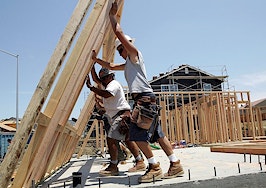Today’s the day: Join us for Inman Connect Now today to dig into key topics like finding success despite low inventory, preventing burnout, utilizing the Clubhouse audio app to increase leads, and much more. Register now to watch the rest of the day live, and catch up on what you missed on-demand.
The pandemic has turned that single-family home in the suburbs into a highly desirable object. But sellers are scarce, and builders are having trouble swinging their hammers fast enough to catch up with demand.
If you’re a real estate agent, Brad Inman just summed up the inventory shortage nicely: “Twenty people were invited but you only have one 12-inch pizza. What do you do?”
At Connect Now Tuesday, brokers from across the country shared insights into their markets, and how they’re adapting to the current inventory insanity during a panel discussion titled, “Market Trends: What’s Heating Up in 2021.” They shared keen advice on keeping buyers motivated, keeping sellers focused during bidding wars, bringing new listings to market and accomplishing these goals without compromising your values.
Educating buyers

Amy Somerville
While every market is unique, some common themes emerged during the panel discussion, moderated by Amy Somerville of Moment of Clarity LLC.
Real estate agents are acutely aware of inventory shortages in their markets. But homebuyers may be shocked at how slim the pickings have become — particularly if they’re first-time buyers looking for a move-in ready, single-family home.
“It’s not like everyone’s leaving Seattle — I don’t want to perpetuate that,” said Anne Jones, designated broker-owner of Windermere Abode in Tacoma, Washington. “But anybody who’s trying to buy a home for the first time is definitely coming down here.”

Anne Jones
Jones said the pandemic has pushed the median sales price of a single-family home in Pierce County, Washington to $470,000. That’s still within the reach of highly paid workers from Seattle, but it’s put “a tremendous amount of pressure on our local renters, would-be homebuyers,” Jones said.
Whether that single-family home in the suburbs will remain red hot after the pandemic fades remains to be seen, said Chicago-based Tommy Choi, cofounder of Weinberg Choi Residential.
With 77 neighborhoods, the Chicago market is like “A Tale of Two Cities,” Choi said.

Tommy Choi
The market for single-family homes “is on fire. There’s 1 1/2 months of supply here in Chicago, because everyone wants that detached, single-family home,” Choi said. “They want the yard, they want more interior space.”
But on Chicago’s Gold Coast, “We have a year’s worth of [supply of] high-rise condos, because there are more people looking to sell and leave and move up into more space than are coming in right now,” Choi said.
A lot of that has to do with the conditions that the pandemic created, he noted.
“Restaurants were closing down, retail wasn’t as open, accessibility, and a lot of these high rises, especially these luxury buildings, the amenities they have — like the pools, the gyms, the sun decks — a lot of those were closed off access from a safety standpoint.”

Terrence Murphy
TM5 Properties CEO, broker and founder Terrence Murphy said he’s seeing a similar trend play out in College Station, Texas, which is located at the center of a job-center triangle with Austin, Dallas-Ft. Worth, and Houston in the corners.
“For us, people are looking for ranches,” Murphy said. “Mainly because the dense areas we have, where we have a lot of new homes, more production type neighborhoods, those are people who instead of trading up to another home, they’re trying to find land.”
As the pandemic winds down, conditions could change rapidly. Until then, “I think the key word is expectations,” Choi said. “A lot of buyers, they want to come in with this mindset that they’re going to get the win, but they’re [submitting a lot of losing offers] before they get to that one property. It’s just setting that expectation so that buyer fatigue doesn’t kick in or, when it does, that they know this is part of the course. It’s not just them … it’s just really competitive.”
Jones said agents can help their clients by doing their homework. When there’s a pending sale, she said, pick up the phone and grill the listing agent.
“What were the terms? How much can you give me? Because I’m going to write an offer on the house down the street, and we’re watching prices leap by $50,000, $100,000, in waves,” Jones said. “So the sale that closed behind you 30 days ago is almost irrelevant. You’re really having to lean on those pending sales. Some of those things are not so much about what the buyer’s doing, but really an opportunity for the agent to do some legwork and get some info.”
Keeping sellers focused
Bidding wars can create distractions for sellers, including personal appeals from buyers.
“The love letters — we have to stop encouraging these things,” Choi said. “If your buyer wants to do this, you have to say no.”
Love letters “could contribute to housing discrimination that’s been in play in our communities for a long, long time,” Jones said. The time to explain this to clients is before offers come in, she said.
“If it’s not the day of the letters, [clients] will say, ‘That’s great, I don’t need those. Bring me an offer that meets my terms, and my needs.’ ”
Bringing new listings to market
One dilemma facing would-be sellers is, where will they find their next home?
“Well, if you’re a listing agent, you have a pipeline of potential listings that you can put them in front of, and that’s another value proposition for you,” Murphy said.
Murphy is also a fan of diversification.
“If you’re doing condos, try to go get some luxury, get some new build,” he said. “For us, we mainly do ranches, we do luxury, and we do new build, but we also do investment properties.”
Jones sees an opportunity for agents to build their referral business.
“As affordability has become such a problem, brokers getting out and educating people on other cities, and look-alike neighborhoods, and places where maybe they hadn’t explored, instead of just that jam up of everyone wanting to land in only one place,” she said. “There are lots of other communities that are interesting. For somebody who’s frustrated because they can’t get somebody into a home, be the person to discover something new. Get out of your comfort zone a little bit.”
Stay true to your values
The pressure to close deals is immense, panelists acknowledged.
Jones said the pressure is so great that people are feeling panicky, and “We’re seeing some pretty desperate moves.” At Windermere Abode, she said, there have been internal discussions about how agents can best serve their clients.
“How are we still upholding the pillars of our practice? How are we making sure that we’re providing an equitable process?” Jones said. “And whether that’s sticking to an offer review date, so everybody has an opportunity to get in the house and submit their best offer, and you make sure that your seller gets the best terms, or discouraging people from submitting love letters and sticking to the business terms of the deals that come in. All of that coaching has to happen before the moment the offer is on the table.”
“Never lose your integrity over one transaction,” Murphy said. Real estate “is something that you want to do for a long time. The market will shift again. And those people, whether they’re buyers or sellers, will remember how you treated them.”
“It’s Fair Housing Month, and so whatever’s happening in your market, slow down,” Jones advised. “It’s insane everywhere, but you have to make time, particularly with these market conditions, to make sure you are practicing at the highest level of integrity — no matter what else is going on.”
For more on shortages of new and existing homes, see Inman’s Inventory Insanity series:
- Part 1: Why are there no homes for sale in America?
- Part 2: Notes from exhausted agents on the front lines of the inventory shortage
- Part 3: The secret economic forces fueling the housing shortage
- Part 4: What it’s like being a homebuyer when there are no homes to buy
- Part 5: When will this supply shortage end?








